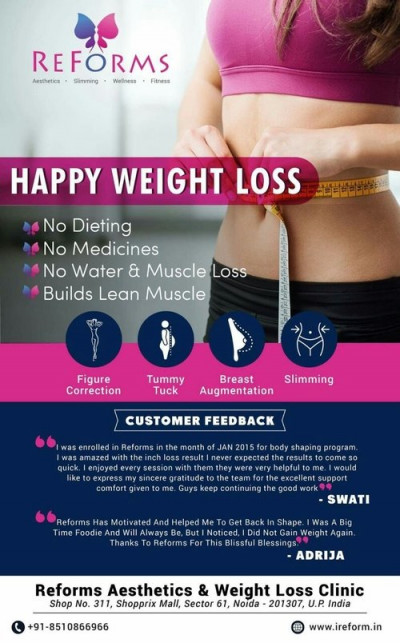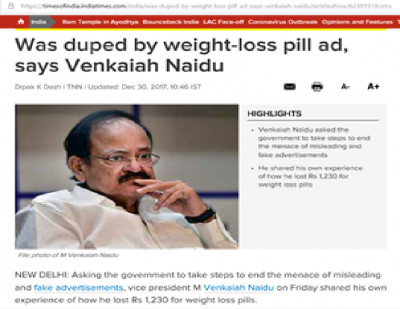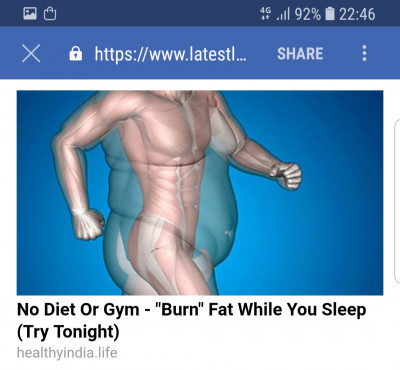Making Misleading Claims: The case of a weighty problem & gullible consumers
‘You can’t have the cake and eat it too’ – is a commonly known idiom. Yet wouldn’t it be tempting to believe that you can do that, if advertisers harp the easy way to do that through their advertisements? And who wouldn’t want to eat and yet lose weight or have a slim body or 6-pack abs with the bare minimal efforts? This article by Advocate Aazmeen Kasad is part of a series of articles on Misleading Advertising. Part 8 covers the aspect of the weighty claims made by manufacturers of products and service providers which are misleading the gullible consumer.
India is a country where food is celebrated, with diverse cuisines available, rich in fats and oil, across the country. The heavy monsoons and severe winters make a compelling reason for people to consume hot beverages (having sugar)and binge on freshly made steaming hot bhajjias (fritters), samosas, batata vadas or medu vadas, all deep fried in oil. The sultry summers necessitate being hydrated with, inter alia, chilled soft drinks and packaged fruit juices (which come laden with sugar). A majority of Indians enjoy watching sporting events, rather than participating in it. Added to that is the fact that the sultry tropical weather and pollution make exercising through walks, jogging or cycling an avoidable task. It is no wonder then that many Indians suffer from a weight issue.
Also read: Advertisers beware: Make ‘fair’ claims for your skin-care products
Along with the ongoing festive season comes the wedding season – and almost every individual will aspire to look his/ her best (physically), as they meet family and friends. Ahead of that, precedes the wish to shed the additional inches, especially around the waist and hips; and kilos of weight over-all, in the quickest possible manner and with the least amount of effort.
It is no wonder then that a raft of ads surface each year, around this time, making tall claims of weight-loss through food supplements, amongst other marketed products and services such as belts and massages. In the recent past, surgical procedures (liposuction, bariatric surgery, etc.) caught the fancy of several individuals and despite the medical risk associated with some of these procedures, many people who were silently battling with a weighty problem decided to go under the knife, on the basis of the tall claims made in the advertisements by clinics.
Advertisers invariably resort to a ‘before-and-after’ form of comparative advertising to show the efficacy claims of their products and procedures. While making an efficacy claim for its product, advertisers should ensure that the same can be substantiated in the form of research reports or laboratory studies, etc., corroborating their claims. Companies claim that an additional supplement can help lose weight without exercising or dieting. Where a product manufacturer claims that usage of its product can help reduce inches of weight in days or weeks, without any substantiation, it is considered to be a ‘misleading by omission’ claim.
Making claims of being the ‘Best weight management program’ without furnishing details of the basis of the superlative assertion being made, is considered to be a ‘misleading by exaggeration’ claim.
Not disclosing important information in an advertisement is misleading a consumer’s trust, and putting the health of the individual at risk, in certain cases. For instance, an ingredient, like the Garcinia Cambogia fruit or the Malabar Tamarind, which is a small, yellow coloured pumpkin shaped fruit, is marketed as a natural weight-loss food supplement, with no additional effort. It is claimed that the peel of the fruit contains high amounts of hydroxycitric acid (HCA), which is the active ingredient believed to be responsible for most of its weight loss tablets’ benefits. In the advertisement, the claim made is that it makes the body feel full and reduces your appetite, may block fat production and reduce belly fat, it enhances an athletic ability of the body, etc. The advertisement fails to make a mention of the side effects of taking the supplement which can make one’s blood sugar fall to dangerously low levels and can be harmful for diabetics, pregnant women, women who are breast-feeding, patients with Alzheimer, Dementia, Bipolar Disorder, etc. This is ‘misleading the consumer by omission and implication’.
Being overweight or obese invariably, subjects one to ridicule, body shaming, causes anxiety of being rejected socially and lowers one’s self-esteem. Conversely, individuals who are slim (for women); and with a well-toned body (for men) are perceived to be people who take care of their health and are sought after, personally and professionally, and are considered confident by nature. Weight-loss products ads play on the aspirations and insecurities of the target consumer. They are misleading if they claim to be able to help one lose inches of flab or belly fat and kilos of weight, and consequently ensure a healthy life, without being able to provide any claim support data. This naturally ultimately leads to disappointment in the mind of the consumer.
Per Section 2(1) of the recently amended Consumer Protection Act, 2019, (the ‘Act’), an ‘advertisement’ means any audio or visual publicity, representation, endorsement or pronouncement made by means of light, sound, smoke, gas, print, electronic media, Internet or website and includes any notice, circular, label, wrapper, invoice or such other documents. Therefore, this includes advertisements not only on the traditional media such as print, radio or television advertisements, but also includes packaging, point of sale material, etc. Advertisements on the Internet, including social media such as ads posted on Facebook, Instagram, Twitter, LinkedIn, etc., also fall within the purview of the Act, as do advertisements on websites, which includes the advertiser’s own website(s).
As per the Act, a ‘misleading advertisement’ in relation to any product or service, means an advertisement, which (i) falsely describes such product or service; or (ii) gives a false guarantee to, or is likely to mislead the consumers as to the nature, substance, quantity or quality of such product or service; or (iii) conveys an express or implied representation which, if made by the manufacturer or seller or service provider thereof, would constitute an unfair trade practice; or (iv) deliberately conceals important information.
Per section 2(47) of the Act, an ‘unfair trade practice’ means a trade practice which, for the purpose of promoting the sale, use or supply of any goods or for the provision of any service, adopts any unfair method or unfair or deceptive practice, including any of the following practices, namely (i) making any statement, whether orally or in writing or by visible representation, including by means of electronic record, which (a) falsely represents that the goods are of a particular standard, quality, quantity, grade, composition, style or model; (d) represents that the goods have sponsorship, approval, performance, characteristics, accessories, uses or benefits which such goods do not have; (f) makes a false or misleading representation concerning the need for, or the usefulness of, any goods.
The Ministry of Health and Family Welfare has tabled the Drugs and Magic Remedies (Objectionable Advertisements) (Amendment) Bill, 2020, under which the draft amendment bans advertisements of products, inter alia, for obesity. The Bill proposes imprisonment of up to two years and fine up to Rs 10 lakh for the first conviction and imprisonment extendable to five years with a fine of up to Rs 50 lakh for subsequent offences. While the ban and the penalties will only be effective once the Bill is passed and becomes an Act, it is imperative for manufacturers, marketeers, endorsers and publishers of advertisements of products and procedures to treat obesity to exercise caution in the claims that are made through their advertisements.
In light of the newly introduced provisions under the Act, which came into force from July 20, 2020, it is advisable for not only the advertisers and the endorsers, but also the publishers of the advertisements to exercise caution on the claims that form part of the advertisement of the goods/ services. Under the Act, any advertiser, trader, publisher and endorser found to be guilty of a false or misleading advertisement, may receive an order from the Central Consumer Protection Authority, with directions to the concerned trader or manufacturer or endorser or advertiser or publisher, as the case may be, to discontinue such advertisement or to modify the same in such manner and within such time as may be specified in that order. If the Central Authority is of the opinion that it is necessary to impose a penalty in respect of such false or misleading advertisement, by a manufacturer or an endorser, it may, by order, impose on manufacturer or celebrity endorser a penalty which may extend to Rs 10 lakh in the first instance and for every subsequent contravention by a manufacturer or endorser, a penalty, which may extend to Rs 50 lakh may be imposed. Additionally, where the Central Authority deems it necessary, it may, by order, prohibit the celebrity endorser of a false or misleading advertisement from making endorsement of any product or service for a period which may extend to one year in the first instance, which may extend to three years for every subsequent contravention. Any person found to publish, or is a party to the publication of a misleading advertisement, except in the ordinary course of his business, may be penalised with a fine which may extend to Rs 10 lakh. The defence that the false or misleading advertisement was published in the ordinary course of business shall not be available to such person if he had previous knowledge of the order passed by the Central Authority for withdrawal or modification of such advertisement.
Weight loss miracle pills or procedures often sell a dream that do not exist. Consumers should recognise that having a fit physique requires a consistent and sustained fitness regime, which includes maintaining a healthy diet. Supplements may support these efforts, but nothing will replace these important staples to a healthy life.
Honest advertising can empower consumers into making better buying decisions; while for advertisers, it can garner goodwill, trust, brand loyalty, higher sales which translates into higher revenues and profits. On the other hand, deceptive or misleading advertising can hurt the brand, expose the advertiser to legal risks and fines and also loss of consumer trust and in the long run, consumers. The ensuing Parts of the series will pertain to various other aspects of what constitutes Misleading Advertising and key judicial precedents on the same.
(Advocate Aazmeen Kasad is a practicing corporate advocate with over 20 years of experience, with a focus on the Media, Technology and Telecom industries. She is also a professor of law since 13 years. She is a member of the Consumer Complaints Council of the Advertising Standards Council of India. She is a speaker at several forums.)
























Share
Facebook
YouTube
Tweet
Twitter
LinkedIn